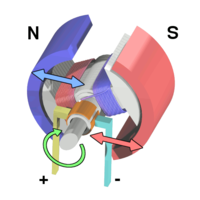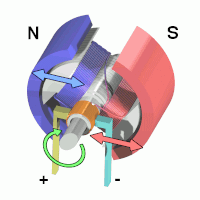Wikipedia:Reference desk/Archives/Science/2021 October 23
| Science desk | ||
|---|---|---|
| < October 22 | << Sep | October | Nov >> | October 24 > |
| Welcome to the Wikipedia Science Reference Desk Archives |
|---|
| The page you are currently viewing is a transcluded archive page. While you can leave answers for any questions shown below, please ask new questions on one of the current reference desk pages. |
October 23
[edit]Question on Brush in DC motors.
[edit]How do brushes change polarity in DC motor? By changing polarity, torque produced, hence shaft rotates on its axis Rizosome (talk) 00:07, 23 October 2021 (UTC)
The following graphics illustrate a simple, two-pole, brushed, DC motor.
--84.190.201.130 (talk) 01:17, 23 October 2021 (UTC)
- The magic happens in the Commutator (electric). That article explains it rather better I think.--Shantavira|feed me 08:22, 23 October 2021 (UTC)
- Or the OP could more simply read the caption to the 3rd diagram, where the question is answered.--Phil Holmes (talk) 09:31, 23 October 2021 (UTC)
What happens if commuter never reverse the current each half revolution? Will the armature come back to original position or stuck in vertical position? Rizosome (talk) 00:04, 24 October 2021 (UTC)
- If it didn't reverse the current it would no longer be a commutator. A commuter (if travelling by electric transport) would eventually come to a halt and become stuck in the horizontal position before overheating and burning out. The same would happen to the above (former) commutator.--Shantavira|feed me 09:05, 24 October 2021 (UTC)
Here commuter changing polarity by rotating the closed circuit i.e armature here? Is this how it converting supplied DC to AC? Rizosome (talk) 06:07, 25 October 2021 (UTC)
- Do you even understand what a commuter is? ←Baseball Bugs What's up, Doc? carrots→ 13:59, 25 October 2021 (UTC)
Main article says: . As the shaft rotates, the commutator reverses the flow of current in a winding.
But it doesn't say how it reverse the current flow. There is no alternator to convert DC current. Rizosome (talk) 16:18, 25 October 2021 (UTC)
- The commuter is shown in the figure, it consists of 2 parts of copper band, with non-conducting parts (e.g. holes) between these parts. Each band is connected to the coils in such a way that the magnetic fields of the coils are opposite. The holes in the band are positioned such that when the coils become horizontal, the positive and negative wire are no longer in contact with the copper bands. when the coil rotates a bit more, the wires connect to the other band than before, reversing the electic flow and thus the polarity of the coils.
- With the model shown above, if the coils start with their magnetic fields aligned, the motor won't turn and needs a nudge to start. Rmvandijk (talk) 09:19, 28 October 2021 (UTC)
Why does LiDAR have the ability to see depth through mirrors?
[edit]Hi all.
Recently got a new phone, and it has a LiDAR camera on it. I've noticed, however, that when looking at the pure depth information from it, it has the ability to see the depth of objects beyond mirrors (almost as if you flipped the room using the mirror's plane as the axis of symmetry). Why is this? I thought mirrors reflect light, not depth...? Or is it simply the mirror just reflecting the LiDAR rays?
I've taken a picture of my bathroom mirror to highlight what I'm referring to.

DrawWikiped(talk) 21:36, 23 October 2021 (UTC)
- correct, the mirror reflects both the incident lidar beam and the lidar beam reflected from the object; so lidar registers the object as if it was on the other side of the mirror. It's worse with glass panes: in most cases lidar doesn't "see" them at all; it only sees through them . Dr Dima (talk) 23:46, 23 October 2021 (UTC)
- @Dr Dima, interesting! obviously this is just a phone, but if this was for some more serious use (photoscanning for a house sale or something, I dunno), would there be any way to get it to register the mirror as a flat plane? not that i have that need, just curious DrawWikiped(talk) 00:12, 24 October 2021 (UTC)
- The "problem" of mirrors in LiDAR is a topic of interest to robotics and other applications that involve real-time mapping for navigation. Here's a now-oldish lead-ref that proposes some solutions: doi:10.1109/TMECH.2010.2040113. DMacks (talk) 05:33, 24 October 2021 (UTC)
- One amusing (and potentially frustrating) real-world consequence of this is that some automatic vacuum cleaners are confused, add imaginary rooms to their maps, and then sometimes get stuck trying to enter those imaginary rooms.[1] ApLundell (talk) 19:23, 24 October 2021 (UTC)
- @Dr Dima, interesting! obviously this is just a phone, but if this was for some more serious use (photoscanning for a house sale or something, I dunno), would there be any way to get it to register the mirror as a flat plane? not that i have that need, just curious DrawWikiped(talk) 00:12, 24 October 2021 (UTC)




